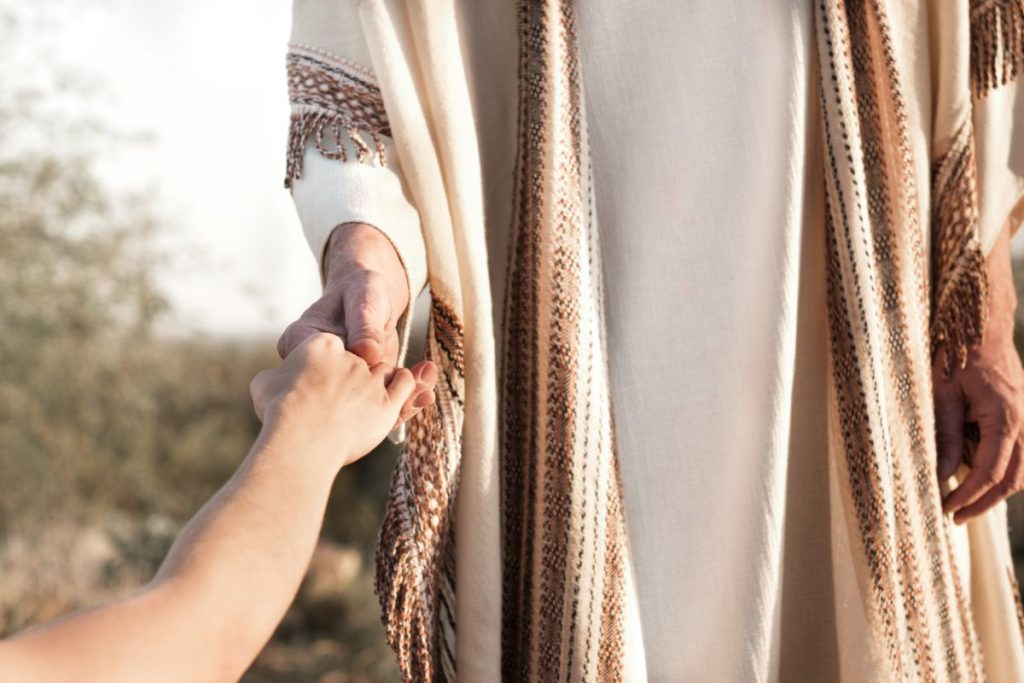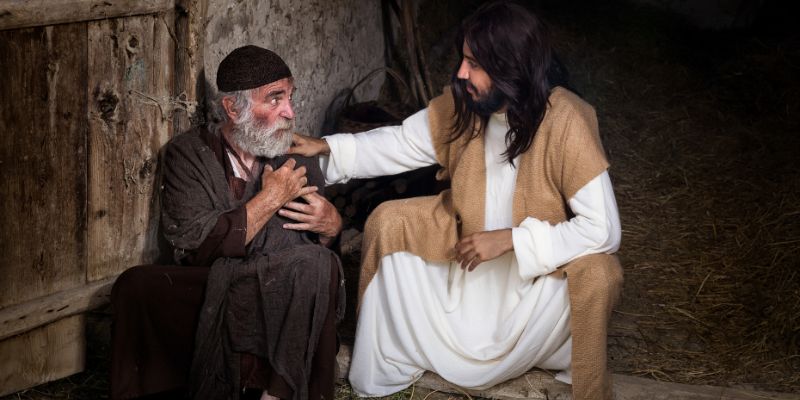7 Times Jesus Taught Us About Kindness

Published February 12, 2024
In the Bible, we read many stories about Jesus’ ministry. He healed the sick and performed miracles. But we often fail to see the lessons he is trying to teach us through those acts.
Let’s not forget that Jesus is one of the greatest teachers. He used parables and stories to teach us about the kingdom of God. But his greatest method is teaching by example.
His deeds taught us about many Christian values, such as kindness and compassion. He raised children from the dead out of pity for their parents and accepted disciples from all walks of life. Most important of all, he gave up his life so all of us could be saved.
Bible Stories About Kindness
Here are five more Bible stories of Jesus teaching us about kindness.
1. Healing the Leper
When Jesus came down from the mountainside, large crowds followed him. A man with leprosy came and knelt before him and said, “Lord, if you are willing, you can make me clean.”
Jesus reached out his hand and touched the man. “I am willing,” he said. “Be clean!” Immediately he was cleansed of his leprosy. Then Jesus said to him, “See that you don’t tell anyone. But go, show yourself to the priest and offer the gift Moses commanded, as a testimony to them.” – Matthew 8:1-4
Because of the communicability of their disease, lepers have been considered outcasts in Jesus’ time. They lived separately and were considered “unclean” and “untouchable.”
But Jesus, taking pity on the leper, healed him of his disease. He didn’t see the man as a leper but a sick human who needed his help.
Through this, Jesus taught us that kindness should go beyond social stereotypes. We should look at where they’re coming from and understand their circumstances. Only then can we develop genuine compassion.
In the words of Mother Teresa, “If you judge people, you have no time to love them.”
2. Dining With a Sinner
Jesus entered Jericho and was passing through. A man was there by the name of Zacchaeus; was a chief tax collector and was wealthy. He wanted to see who Jesus was. But because he was short, he could not see over the crowd. So he ran ahead and climbed a sycamore-fig tree to see him since Jesus was coming that way.
When Jesus reached the spot, he looked up and said to him, “Zacchaeus, come down immediately. I must stay at your house today.” So he came down at once and welcomed him gladly.
All the people saw this and began to mutter, “He has gone to be the guest of a sinner.”
But Zacchaeus stood up and said to the Lord, “Look, Lord! Here and now I give half of my possessions to the poor, and if I have cheated anybody out of anything, I will pay back four times the amount.”
Jesus said to him, “Today salvation has come to this house, because this man, too, is a son of Abraham. For the Son of Man came to seek and to save the lost.” – Luke 19:1-10
Would you be willing to dine with an ex-convict, a known sinner? Most of us would have hesitated, while others would flat-out say “no.”
Zacchaeus may not be a convicted criminal, but in the eyes of the Jews, he might as well be. In Jesus’ time, tax collectors often abused their powers to line their pockets with the people’s hard-earned money.
Yet, Jesus never hesitated to dine with him. He didn’t care if others would see him associating with a sinner. He didn’t care if people would hate him for it. That is the kind of kindness that the world needs today. (Related: 50 Acts of Kindness You Can Do Today)
We should stop seeing people for the wrongs they’ve committed. Instead, we should judge how they try to right those wrongs and turn their lives around.
3. Preaching to the Gentiles
Now he had to go through Samaria. So he came to a town in Samaria called Sychar, near the plot of ground Jacob had given to his son Joseph. Jacob’s well was there, and Jesus, tired from the journey, sat down by the well. It was about noon.
When a Samaritan woman came to draw water, Jesus said to her, “Will you give me a drink?” (His disciples had gone into the town to buy food.)
The Samaritan woman said to him, “You are a Jew, and I am a Samaritan woman. How can you ask me for a drink?” (For Jews, do not associate with Samaritans.)
Jesus answered her, “If you knew the gift of God and who it is that asks you for a drink, you would have asked him and he would have given you living water.”
“Sir,” the woman said, “you have nothing to draw with and the well is deep. Where can you get this living water? Are you greater than our father Jacob, who gave us the well and drank from it himself, as did also his sons and his livestock?”
Jesus answered, “Everyone who drinks this water will be thirsty again, but whoever drinks the water I give them will never thirst. Indeed, the water I give them will become in them a spring of water welling up to eternal life.” – John 4:4-14
Xenophobia is one of the biggest problems the world has today. But this prejudice of foreigners has been going on even in Jesus’ time.
The Samaritan woman is a foreigner; in the eyes of a Jew, she’s a gentile. These two races don’t associate. It’s frowned upon to talk to a gentile.
Thus, by preaching to a Samaritan woman, Jesus broke societal boundaries and showed us that kindness is universal. We shouldn’t only be kind to those of our race. Everybody deserves compassion regardless of their skin color or religious beliefs.
4. Showing Compassion to the Sick
As Jesus was on his way, the crowds almost crushed him. And a woman was there who had been subject to bleeding for twelve years, but no one could heal her. She came up behind him and touched the edge of his cloak, and immediately her bleeding stopped.
“Who touched me?” Jesus asked.
When they all denied it, Peter said, “Master, the people are crowding and pressing against you.”
But Jesus said, “Someone touched me; I know that power has gone out from me.”
Then the woman, seeing that she could not go unnoticed, came trembling and fell at his feet. In the presence of all the people, she told why she had touched him and how she had been instantly healed. Then he told her, “Daughter, your faith has healed you. Go in peace.” – Luke 8:40-48
In this story, Jesus could have reprimanded the woman for touching. But he didn’t. Since women didn’t have many rights then, he could have “put her in her place.” Yet, he chose not to.
Instead, he called her daughter – a term of endearment. He understood her struggles and desperation, which led her to do what she did.
What do you think the woman felt at that moment? She was clearly scared as she was trembling. It’s possible that because of her illness, she wasn’t treated well by the people around her. But can you imagine her relief when Jesus showed her kindness and compassion instead of reproach? How do you think this single act of kindness changed that woman’s life?

5. Forgiving Those Who Hurt Him
While he was speaking, a crowd came up, and the man called Judas, one of the Twelve, was leading them. He approached Jesus to kiss him, but Jesus asked him, “Judas, are you betraying the Son of Man with a kiss?”
When Jesus’ followers saw what would happen, they said, “Lord, should we strike with our swords?” And one of them struck the servant of the high priest, cutting off his right ear.
But Jesus answered, “No more of this!” And he touched the man’s ear and healed him. – Luke 22:47-52
In spite of his imminent death, Jesus still found it in him to heal the man who arrested him. Even while hanging on the cross, he still managed to ask his father to spare the people who hurt him because they didn’t know what they were doing.
Forgiving those who’ve done us wrong is one of the greatest acts of kindness you can do – not only for others but for yourself too. You give your enemies the chance to redeem themselves and yourself the opportunity to heal.
6. The Woman Who Poured Perfume
Jesus was at the table in the home of Simon, who had a skin disease. A woman came with a special sealed jar. It contained very expensive perfume. She broke the jar open and poured the perfume on Jesus’ head.
When the disciples saw this, they were indignant., “Why waste this perfume? It could have been sold at a high price. The money given to poor.” So they found fault with the woman.
“Leave her alone,” Jesus said. “Why are you bothering her? She has done a beautiful thing to me. You will always have the poor. But you will not always have me. She did what she could.
She poured perfume on my body to prepare me to be buried. What I’m about to tell you is true. What she has done will be told anywhere the good news is preached all over the world. It will be told in memory of her.” – Matthew 26:6-13
Such an act of anointing is a profound symbol of honor and respect, often reserved for esteemed guests or individuals of great importance. It is a way to show deep admiration and reverence.
However, not everyone in the room shares the same sentiment. Judas Iscariot, one of Jesus’ disciples, voices his disapproval. Jesus, ever wise and compassionate, understands the concerns Judas and others raised. However, He responds with gentle wisdom. He acknowledges the beauty and significance of the woman’s gesture, recognizing it as a heartfelt expression of love and devotion.
This story teaches us the importance of recognizing and cherishing acts of love and devotion, even when they might seem unconventional or extravagant. It reminds us that sometimes, expressions of love can transcend practicality and touch the depths of our souls.
7. Healing the Blind
Jesus, his disciples, and a large crowd were leaving Jericho. Bartimaeus, son of Timaeus, a blind beggar, was sitting by the roadside. When he heard that it was Jesus of Nazareth, he shouted and said, “Jesus, Son of David, have mercy on me!” Many sternly ordered him to be quiet, but he cried even more loudly, “Son of David, have mercy on me!”
Jesus stood still and said, “Call him here.” And they called the blind man, saying, “Take heart; get up, he is calling you.” So throwing off his cloak, he jumped to his feet and came to Jesus.
Then Jesus asked him, “What do you want me to do for you?”
The blind man said to him, “I want to see.”
Jesus told him, “Go; your faith has healed you.” Immediately he regained his sight and followed him on the way.
In this Bible story, Jesus showed kindness by listening to the plea for mercy, engaging with Bartimaeus directly, addressing his specific needs, and restoring his sight.
How about you? What’s the greatest lesson about kindness you’ve learned from the bible? Tell us in the comments.
Did you like this post? Check out our piece on the Four Types of Giving According to the Bible and The Simple Formula to a Happy Life.
Donate To The Poor & Homeless Of South Florida
Our Father’s House Soup Kitchen has fed the poor and homeless in South Florida over 900,000 hot meals since 1993. Our tax deductible non profit organization also accepts and distributes donations such as clothing, toiletries, shoes, bicycles, and more. You can donate to help the poor and homeless through our website.

Reviewed For Factual Accuracy
Our team meticulously fact-checks all website content before publishing. Discover more about our website’s editorial standard here and the dedication we uphold.

About The Author
Judy Ponio is a professional writer and devoted Christian. She has a passion for writing about topics related to morality and helping the poor and homeless. She is the lead author for the Our Father’s House Soup Kitchen blog.
Correct Digital, Inc is paid by private donors to provide website digital marketing services to this non-profit organization.





